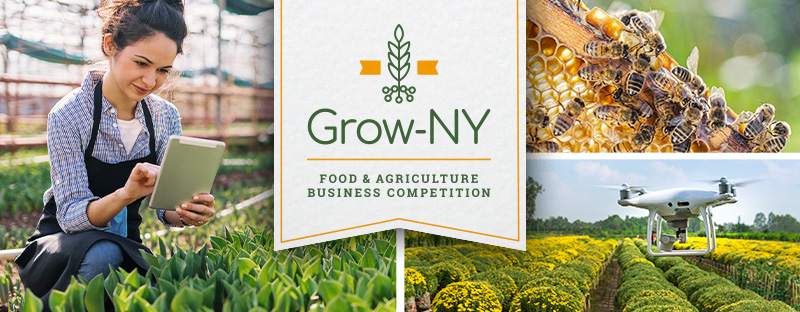Programs
Grow-NY Youth Competition

Grow-NY PBL Instructions
Background Agricultural Connections
The Grow-NY Competition is designed as a Project-Based Learning (PBL) plan. PBL is a teaching method in which students gain knowledge and skills by investigating and responding to an authentic, engaging, and complex question, problem, or challenge over an extended time period
A quality PBL experience requires seven essential elements.
- Challenging Problem or Question: The project is framed by a meaningful problem to be solved or a question to answer, at the appropriate level of challenge.
- Sustained Inquiry: Students engage in a rigorous, extended process of posing questions, finding resources, and applying information.
- Authenticity: The project involves real-world context, tasks and tools, quality standards, or impact, or the project speaks to personal concerns, interests, and issues in the students' lives.
- Voice and Choice: Students make some decisions about the project, including how they work and what they create.
- Reflection: Students and teachers reflect on the learning, the effectiveness of their inquiry and project activities, the quality of student work, and obstacles that arise and strategies for overcoming them.
- Critique and Revision: Students give, receive, and apply feedback to improve their process and products.
- Public Product: Students make their project work public by explaining, displaying, and/or presenting it to audiences beyond the classroom.
Interest Approach - Engagement
At the beginning of the project, students are introduced to key content using a compelling situation that provides context and serves as a catalyst for an authentic problem or challenge. In Project-Based Learning (PBL), this authentic problem/challenge is referred to as an "Entry Event." Students use the Entry Event to initiate inquiry by reflecting on their prior knowledge of the key content, generating questions that they need to know the answers to in order to successfully complete the project or process that will solve the problem, and identifying what their next steps might be to answer their questions. These questions are used in an ongoing way throughout the project to track learning and guide inquiry. While students may have several questions, one driving question needs to be agreed upon that, when answered, should address the initial situation. Refer to Milestone 1 for Entry Event procedures.
Procedures
In PBL, projects are organized into milestones. Each milestone represents a significant stage of the project.
- Milestone 1: Entry Event (approximately 1 day)
- Milestone 2: Planning and Design (approximately 2 days)
- Milestone 3: Prototype (approximately 3 days)
- Milestone 4: Marketing Plan and Final Product Presentation (approximately 4 days)
Concept Elaboration and Evaluation:
As a final wrap-up, review and summarize the following key points:
- Anyone who acts on an idea can be an entrepreneur.
- Successful entrepreneurs have a distinct personality trait that sets them apart from other organizational leaders.
- Businesses and product ideas need to be adaptable to fit the market(s) you aim to serve.
- An ideal business pitch should grab the attention of your audience. take them on a clear and logical journey. leave them with a compelling call to action.
